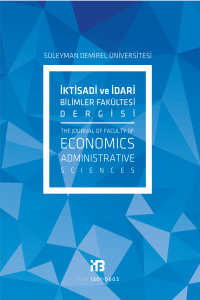ASİMETRİK BİLGİNİN E-TİCARET ÜZERİNDEKİ ETKİLERİ: TÜKETİCİLERİN GÜVEN EĞİLİMLERİ ÜZERİNE BİR ARAŞTIRMA
E-ticaret, Güven, Asimetrik Bilgi, Ters Seçim, Ahlaki Tehlike
Asimetrik Bilginin E-Ticaret Üzerindeki Etkileri: Tüketicilerin Güven Eğilimleri Üzerine Bir Araştırma
-,
___
- AKERLOF, G.A. (1970). “The Market for "Lemons": Quality Uncertainty and the Market Mechanism”, The Quarterly Journal of Economics, 84(3): 488-500.
- BAKOS, J.Y. (1998). “The Emerging Role of Electronic Marketplaces on the Internet”, Comminications of The ACM, 41(8): 35-42.
- BROUSSEAU, E. ve CURIEN, N. (2007). Internet and Digital Economics, Cambridge University Press, New York.
- BRYNJOLFSSON, E. ve SMITH, M.D. (2000). “Frictionless Commerce? A Comparison of Internet and Conventional Retailers”, Management Science, 46(4):563-585.
- CABER, M. (2010). Tur Operatörü-Seyahat Acentesi Elektronik Müşteri İlişkileri Yönetiminde Web Sitesi Kalitesinin Memnuniyet ve Güven Üzerine Etkisi, Doktora Tezi, Akdeniz Üniversitesi Sosyal Bilimler Enstitüsü, Antalya.
- CHEN, Y.W. (2006). Factors That Affect Online Consumer Trust in Taiwan, PhD Thesis, Lynn University, Florida.
- CHOI, S.Y., WHINSTON, A. ve STAHL, D. (1997). Economics of Electronic Commerce, Macmillan Technical Publishing, Indianapolis, Indiana.
- DIMOKA, A., HONG, Y. ve PAVLOU, P.A. (2012). “On Product Uncertainty in Online Markets: Theory and Evidence”, MIS, 36(2): 395-426.
- ELLISON, G. ve ELLISON, S.F. (2005). “Lessons about Markets from the Internet”, The Journal of Economic Perspectives, 19(2): 139-158.
- FABEL, O. ve LEHMANN, E.E. (2002). “Adverse Selection and Market Substitution by Electronic Trade”, Int. J. of the Economics of Business, 9(2): 175-193.
- GEFEN, D. (2000). “E-commerce: The Role of Familiarity and Trust”, The International Journal of Management Science, 28: 725-737.
- GEFEN, D., KARAHANNA, E. ve STRAUB, D.W. (2003). “Trust and TAM in Online Shopping: An Integrated Model”, MIS, 27(1): 51-90.
- GRABNER, S. (2002). “The Role of Consumers‟ Trust in Online-Shopping”, Journal of Business Ethics, 39: 43–50.
- HUSTON, J. H. ve SPENCER, R. W. (2002). “Quality Uncertainty and the Internet: The Market for Cyber Lemons”, American Economist, 46(1): 50-60.
- IBRAHIM, A. K., KELLY, S. J., CHALLENOR, E. C. ve GLAZEBROOK, C. (2010). “Establishing the reliability and validity of the Zagazig Depression Scale in a UK Student Population: an Online Pilot Study”, BMC Psychiatry, 10(107): 2-10.
- İYİLER, Z. (2009). Elektronik Ticaret ve Pazarlama, Başbakanlık Dış Ticaret Müsteşarlığı İhracatı Geliştirme Etüt Merkezi, Ankara.
- KIM, D.J., FERRIN, D.L. ve RAO, H.R. (2008). “Trust-based Consumer Decision-making Model in Electronic Commerce: The Role of Trust, Perceived Risk, and Their Antecedents”, Decision Support Systems, 44: 544–564.
- KLEIN, L.R. (1988). “Evaluating the Potential of Interactive Media Through a New Lens: Search Versus Experience Goods”, Journal of Business Research, 41: 195–203.
- KOOTSTRA, G.J. (2004). “Exploratory Factor Analysis: Theory and Application”, http://www.let.rug.nl/~nerbonne/teach/rema-stats-meth-seminar/Factor-Analysis- Kootstra-04.PDF, 26.07.2013.
- LAUDON, K. ve TRAVER, C.G. (2010). Introduction to E-commerce, Prentice Hall, New Jersey.
- LEE, B.C.- ANG, L. ve DUBELAAR, C. (2005). “Lemons on the Web: A Signalling Approach to the Problem of Trust in Internet Commerce”, Journal of Economic Psychology, 26: 607–623.
- LEE, H.G. (1998). “Do Electronic Marketplaces Lower the Price of Goods?”, Communications of The ACM, 41(1): 73-80.
- MCKNIGHT, H., KACMAR, C. and CHOUDHURY, V. (2002). “Whoops…Did I Use the Wrong Concept to Predict E-Commerce Trust? Modelling the Risk-Related Effects of Trust Versus Distrust Concepts”, IEEE Computer Science; Proceedings of the 36 th Hawaii International Conference on System Sciences (HICSS‟03), 182-192.
- PAN, Y. (2008). “Improving the Cyber „Lemons‟ Market with a Trust-Intermediary in E- Commerce”, Wireless Communications, Networking and Mobile Computing (WiCOM '08) 4th International Conference, Print ISBN: 978-1-4244-2107-7: 1-6.
- PAVLOU, P.A., LIANG, H. ve XUE, Y. (2007). “Understanding and Mitigating Uncertainty in Online Exchange Relationships: A Principal– Agent Perspective”, MIS, 31(1): 105-136.
- POLAT, Y. (2012). Faktör Analizi Yöntemlerinin Karşılaştırmalı Olarak İncelenmesi ve Hayvancılık Denemesine Uygulanışı, Doktora Tezi, Çukurova Üniversitesi Fen Bilimleri Enstitüsü, Adana.
- QIN, D. and ZOU, L. (2009). “Discussion on Information Asymmetry in B2C E- commerce”,http://www.seiofbluemountain.com/upload/product/200911/2009zxqy hy09a4.pdf, 25.10.2011.
- STEWART, N. (2009). Reputation in Electronic Markets: An Experimental Study, PhD Thesis, Nova Southeastern University Information Systems Doctor of Philosophy, Florida.
- TAVAKOL, M. ve DENNICK, R. (2011). “Making Sense of Cronbach‟s Alpha”, International Journal of Medical Education, 2: 53-55.
- TIMMERS, P. (1998). Business Models for Electronic Markets, Electronic Markets, 8(2): 3-8.
- VULKAN, N. (2003). The Economics of E-commerce, Princeton University Press, New Jersey.
- ISSN: 1301-0603
- Yayın Aralığı: Yılda 3 Sayı
- Başlangıç: 1996
- Yayıncı: Süleyman Demirel Üniversitesi
Öğr.Gör.Hüseyin FİDAN, Prof.Dr.Mesut ALBENİ
KÜRESEL FİNANSAL KRİZ SÜRECİNDE BİST 100 ENDEKSİ’NDE HAFTANIN GÜNLERİ ETKİSİNİN ANALİZİ
Öğr.Gör.Fatih KONAK, Doç.Dr.Selçuk KENDİRLİ
Yrd.Doç.Dr.Zafer YILDIZ, Yrd.doç.dr.ayşe Durgun KAYGISIZ, Yrd.doç.dr.dilek MEMİŞOĞLU
Öğr.Gör.Dr.Şevket YİRİK, Arş.Gör.Saliha Başak ERDİNÇ, Dr.sedat GÖÇEN
AB YEREL YÖNETİM ANLAYIŞININ YERELE YANSIMALARI: K.MARAŞ BELEDİYELERİ ÖRNEĞİ
Prof.Dr.Uğur YILDIRIM, Arş.Gör.Aziz BELLİ, Nuh ATEŞ, Mehmet Sabri KILIÇ
DİYARBAKIR TEKSTİL VE HAZIR GİYİM SEKTÖRÜNÜN ELMAS MODELİ İLE KÜMELENME ANALİZİ
Recep AKDAĞ, Yrd.Doç.Dr.Mehmet METE, Doç.Dr.Abdurrahim EMHAN
SAĞLIK HİZMETLERİNDE MALİYET ETKİLİLİK ANALİZİ
öğr.gör.dr.vahit YİĞİT, Doç.dr.ramazan ERDEM
yrd.doç.dr.müfide Şule EREN, Emrah TOKGÖZ, Öğr.gör.onur SAYLAN
İNSAN HAKLARININ BÖLGESEL DÜZEYDE KORUNMASI: AMERİKAN SİSTEMİ
